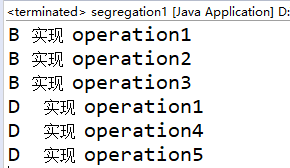接口隔离原则
客户端不应该依赖它不需要的接口,即一个类对另一个类的依赖应该建立在最小的接口上
场景
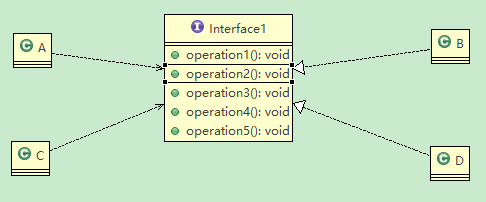
接口Interface1 有5个方法
B 实现接口Interface1 的所有方法
D 实现接口Interface1 的所有方法
需求
类A 通过接口 Interface1 依赖 (使用) B类 只会用到方法1,2,3
类C 通过接口 Interface1 依赖 (使用) D类 只会用到方法1,4,5
问题
如下代码违背了接口隔离原则 B类 4,5方法 类A 不需要用到 D类 2,3方法 类C不需要用到

interface Interface1 { void operation1(); void operation2(); void operation3(); void operation4(); void operation5(); } /*** * B 实现接口Interface1 的所有方法 * @author wf.zhang * */ class B implements Interface1 { public void operation1() { System.out.println("B 实现 operation1"); } public void operation2() { System.out.println("B 实现 operation2"); } public void operation3() { System.out.println("B 实现 operation3"); } public void operation4() { System.out.println("B 实现 operation4"); } public void operation5() { System.out.println("B 实现 operation5"); } } /** * D 实现接口Interface1 的所有方法 * @author wf.zhang * */ class D implements Interface1 { public void operation1() { System.out.println("D 实现 operation1"); } public void operation2() { System.out.println("D 实现 operation2"); } public void operation3() { System.out.println("D 实现 operation3"); } public void operation4() { System.out.println("D 实现 operation4"); } public void operation5() { System.out.println("D 实现 operation5"); } } /** * A 通过接口 Interface1 依赖 (使用) B类 只会用到方法1,2,3 * @author wf.zhang * */ class A { public void depend1(Interface1 i) { i.operation1(); } public void depend2(Interface1 i) { i.operation2(); } public void depend3(Interface1 i) { i.operation3(); } } /** * C 通过接口 Interface1 依赖 (使用) D类 只会用到方法1,4,5 * @author wf.zhang * */ class C { public void depend1(Interface1 i) { i.operation1(); } public void depend4(Interface1 i) { i.operation4(); } public void depend5(Interface1 i) { i.operation5(); } }
代码的关系图
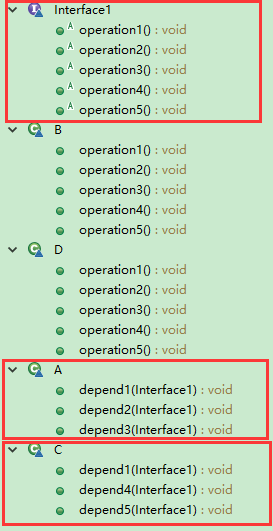
类A通过接口Interface1依赖类B,类C通过接口Interface1依赖类D,如果接口 Interface1对于类A和类C来说不是最小接口,
那么类B和类D必须去实现他们不需要的方法。
解决
接口Interface1拆分为独立的几个接口,类A和类C分别与他们需要的接口建立
依赖关系。也就是采用接口隔离原则
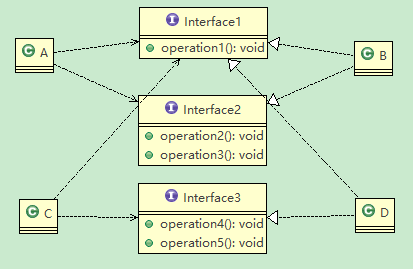
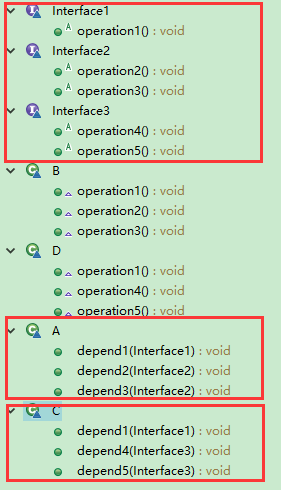
代码实现 关键在于 接口拆分达到最小接口
package com.wf.zhang.segregation.improve; public class segregation1 { public static void main(String[] args) { A a =new A(); //类A 通过接口 依赖类B a.depend1(new B()); a.depend2(new B()); a.depend3(new B()); C c =new C(); //类C 通过接口 依赖类D c.depend1(new D()); c.depend4(new D()); c.depend5(new D()); } } interface Interface1 { void operation1(); } interface Interface2 { void operation2(); void operation3(); } interface Interface3 { void operation4(); void operation5(); } /*** * B 实现接口Interface1 ,Interface2的所有方法 * @author wf.zhang * */ class B implements Interface1,Interface2 { public void operation1() { System.out.println("B 实现 operation1"); } public void operation2() { System.out.println("B 实现 operation2"); } public void operation3() { System.out.println("B 实现 operation3"); } } /** * D 实现接口Interface1,Interface3 的所有方法 * @author wf.zhang * */ class D implements Interface1,Interface3 { public void operation1() { System.out.println("D 实现 operation1"); } public void operation4() { System.out.println("D 实现 operation4"); } public void operation5() { System.out.println("D 实现 operation5"); } } /** * A 通过接口 Interface1,Interface2 依赖 (使用) B类 只会用到方法1,2,3 * @author wf.zhang * */ class A { public void depend1(Interface1 i) { i.operation1(); } public void depend2(Interface2 i) { i.operation2(); } public void depend3(Interface2 i) { i.operation3(); } } /** * C 通过接口 Interface1,Interface3 依赖 (使用) D类 只会用到方法1,4,5 * @author wf.zhang * */ class C { public void depend1(Interface1 i) { i.operation1(); } public void depend4(Interface3 i) { i.operation4(); } public void depend5(Interface3 i) { i.operation5(); } }
